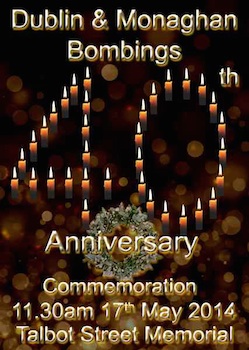
Victims of the 1974 Dublin and Monaghan bombings, which took place 40 years ago this week, are to sue the British government for failing to bring the perpetrators to justice.
Thirty four people, including an unborn baby, died while hundreds were injured when four car bombs exploded on the busy streets of Dublin and in Monaghan town on the evening of Friday May 17, 1984, in attacks blamed on collusion between the Ulster Volunteer Force and British Crown forces. However, no-one was ever convicted.
Campaign group Justice for the Forgotten has announced that a civil action against the British authorities is being taken by Dublin survivor Derek Byrne and Patrick Askin, whose father Paddy was killed in Monaghan.
A lawyer for the two, Kevin Winters, said the families were being moved to take legal action because of their desire to expose the fact that the British authorities had consistently gone “out of their way” to protect the suspects.
Those injured and bereaved by the bombings will mark the 40th anniversary of the attacks on Saturday with wreath-laying and religious ceremonies in both Dublin and Monaghan. At 11.30 am, a wreath-laying ceremony takes place at the Memorial, in Talbot Street, Dublin, where author and historian, Tim Pat Coogan, will deliver the oration. At 12.45 pm, the 40th anniversary Mass takes place in St. Mary’s Pro-Cathedral.
COLLUSION WRIT
Separately, the family of a Sinn Fein member shot dead by loyalists more than 20 years ago is set to sue PSNI chief constable Matt Baggott and the British Ministry of Defence over collusion in his murder.
Tommy Casey was shot dead by unionist paramilitaries at the home of a friend near Cookstown in October 1990. A gun used in the attack has been linked to 17 murders across east Tyrone and north Armagh between 1988 and 1994. A second weapon has also been connected to six loyalist murders during the same period.
The Casey family believe there was collusion between members of the British Crown forces and the paramilitary UVF in his murder.
The father-of-eleven was visiting the empty house when the killer gang struck while his wife sat in a nearby car.
It is believed Mr Casey was not the intended target although in the weeks leading up to the attack his home at Kildress, near Cookstown, was sprayed with gunfire by loyalists.
“From the family point of view it is paramount for us that we seek truth on behalf of our father about his murder,” said his son, Conor Casey. “And not only his but others where collusion has played a part in the Six Counties and further beyond.”
And in other news this week, it has emerged that a gun used in the first fatal shooting carried out by the PSNI, following its redesignation from the RUC, has now been destroyed.
Neil McConville was killed by a PSNI patrol as he was driving a car near Lisburn in April 2003.
The weapon used to kill him was destroyed at some point after it was returned to the PSNI by the Police Ombudsman’s office. With an inquest still to be held, the Ombudsman has now accepted it was a “mistake” to hand back the gun.
A lawyer representing Mr McConville’s former partner said a complaint had been lodged with the Police Ombudsman in an attempt to discover who took the decision to destroy the weapon.
“It’s the sort of thing you associate with RUC collusion allegations when it wasn’t unusual to find that evidence had been interfered with, removed or destroyed altogether”, he said.
![[Irish Republican News]](https://republican-news.org/graphics/title_gifs/rn.gif)
![[Irish Republican News]](https://republican-news.org/graphics/title_gifs/harp.gif)

